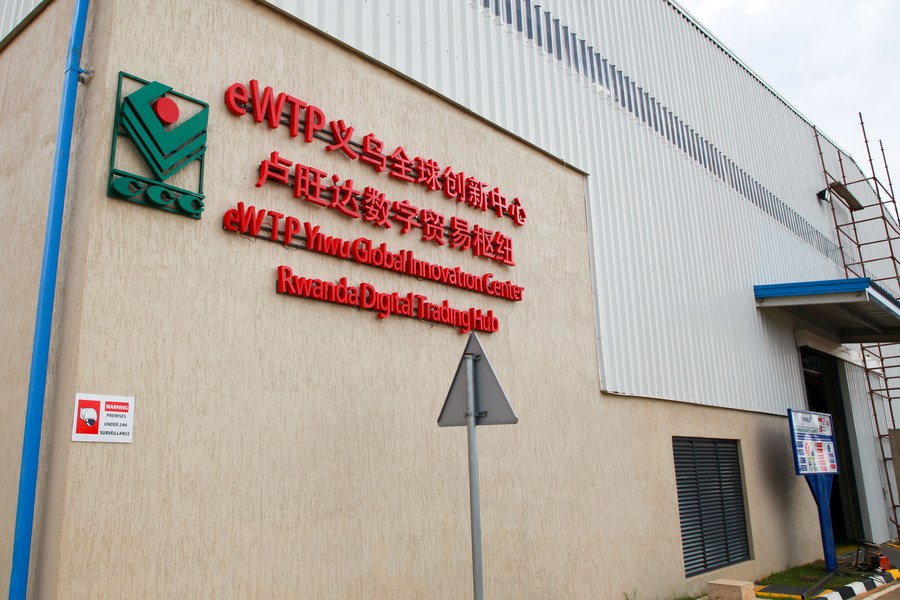-- E-commerce on the African continent has been experiencing exponential growth amid the COVID-19 pandemic.
-- Experts and officials believe that COVID-19 can serve as a catalyst for African countries to achieve digital transformation.
-- Chinese tech giants including Alibaba and Huawei have devoted efforts and resources to help African countries build IT infrastructure and nurture talents.
NAIROBI, Sept. 25 (Xinhua) -- Africa's digital economy has found a silver lining in the ongoing COVID-19 pandemic as more people opted for online shopping to halt the spread of the virus.
The digital transformation on the continent has been further expedited by Chinese players, including e-commerce titan Alibaba and telecom giant Huawei.
Before long, African entrepreneurship passion will be lifted to a record high, as the 2020 Africa's Business Heroes prize competition, a program established by the Jack Ma Foundation's Africa Netpreneur Prize Initiative, is set to reveal its 10 finalists this fall.

A customer receives her order of fresh fruit and vegetable in Harare, capital of Zimbabwe, Sept. 16, 2020. (Xinhua/Tafara Mugwara)
EXPONENTIAL GROWTH
The African people have had their first taste of success in digital transformation as e-commerce on the continent has been experiencing exponential growth amid the COVID-19 pandemic.
Facilitated by Alibaba's Electronic World Trade Platform initiative, an online promotion event for Rwandan coffee via live streaming was held recently to help Rwandan coffee farmers pull through difficulties caused by the pandemic. Some 3,000 bags of coffee beans from Rwanda Farmers Coffee Company were sold out in a second.
"Alibaba came at a time when it was needed the most. In a world that runs digitally, we have to adapt ourselves to e-commerce, and thanks to Alibaba Group, we are tapping into the opportunity since it's one of the best platforms in the e-commerce sector," Pie Ntwali, spokesperson of Rwanda's National Agricultural Export Development Board, told Xinhua.
To mitigate the economic impact of COVID-19, African e-commerce platforms such as SafeBoda, a motorcycle (bodaboda) taxi hailing app connecting market vendors with customers, are giving a boost.
SafeBoda and other e-commerce platforms have seen a triple-digit increase in business following the outbreak of the pandemic, the United Nations Conference on Trade and Development (UNCTAD) announced in August.

Visitors look at coffee products at an exhibition stand during the 17th African Fine Coffee Conference and Exhibition in Kigali, Rwanda, Feb. 14, 2019. (Xinhua/Cyril Ndegeya)
Governments in Africa are helping these e-commerce platforms flourish by fostering an enabling environment for e-commerce and the digital economy, in line with recommendations of an UNCTAD eTrade Readiness Assessment.
In Kenya, revenue streams generated by music aggregators, such as local platform Mdundo, have helped mitigate pandemic-related losses, through the download of artists' music tunes and ringtones for mobile phones. Mdundo, which is expanding its presence in 15 African countries and featuring more than 60,000 African artists, has more than 5 million active users.
"Music downloads have been rising steadily with a 26-percent uptick in 2020's second quarter on the first quarter's 33 million downloads," Mdundo's CEO Wanjiku Koinange said, adding that COVID-19 was also changing the way creative content is being produced.
Under lockdown, the power of online technology has prevailed, making life easier for African residents to access essential services and household basic essentials like food, drinks and hygiene products by means of different online platforms, Alex Ntale, ICT chamber CEO of Rwandan Private Sector Federation, told Xinhua.
Kauthar D'Souza, a Tanzanian housewife residing in Kariakoo, a major market area in Dar es Salaam, said COVID-19 had doubled her online shopping needs.
"Since the outbreak of the COVID-19 pandemic I have been buying all my basic needs including food and clothing online," she said. "Online shopping is the best way of avoiding mass gathering as a way to protect ourselves against the COVID-19."
"The e-commerce has showed great potential and it will be the best model of business in the future of commerce," said Ntwali.

Photo taken on Sept. 7, 2019 shows a logo of Rwanda Digital Trading Hub of Alibaba Electronic World Trade Platform (eWTP) Yiwu Global Innovation Center at Kigali Logistics Platform in Kigali, Rwanda. (Xinhua/Lyu Tianran)
HUGE POTENTIAL
Bora Chitanda, a Tanzanian salesman working in marketing industry, said the culture of online buying and home delivery in Tanzania that had been accelerated following the outbreak of COVID-19 should be maintained even after the disease was contained.
Experts and policymakers have called on African leaders to "think digital" during a virtual session of the African World Summit on the Information Society (WSIS) implementation meeting held early this month under the theme of "COVID-19: A Catalyst to Achieving WSIS Outcomes."
"This is a great opportunity for the continent to transform itself. The digital economy is an important sector, so we need to embrace technology and leapfrog if we are to survive," Head of the Information Society Division at the AU Commission Moctar Yedaly said, adding the Digital Transformation Strategy developed by the African Union is key to transforming Africa.
"Building a digital future is crucial if the continent is to become globally competitive, survive and claim the 21st century," read the outcome statement issued by the UN Economic Commission for Africa (UNECA) after the meeting.
The participants also agreed harnessing digital technologies and innovation to transform Africa's societies and economies as a crucial impetus is "not only to promote Africa's integration but also generate inclusive economic growth, stimulate job creation, bridge the digital divide and eradicate poverty to secure the benefits of the digital revolution for socio-economic development."
"The Information and Communications Technology (ICT) is an important engine for achieving sustainable development goals," said Jean Paul Adam, director of the Technology, Climate Change and Natural Resources Management Division at the UNECA.
"However, our main challenge remains. The digital divide is widespread in Africa with a very low rate of connectivity. We can never meet the 2030 target if we do not urgently address the issue of connectivity across the continent," said Adam.

A local student attends the graduation ceremony of Huawei's Seeds for the Future Program in Harare, Zimbabwe, Sept. 11, 2020. (Xinhua/Tafara Mugwara)
CHINA'S EFFORTS
The good news for Africa is that China is helping the continent to shape the e-commerce ecosystem in a way not seen before, by providing e-commerce platforms, mobile payment technologies and smart phone devices.
E-commerce outlets in Africa such as Jumia are already achieving tremendous growth due to its connectivity with Chinese online firms, notably Alibaba and others.
"China-Africa e-commerce partnerships are scaling up the digital dream that Africa has had, and helping the continent move towards innovation, technology and competitiveness," Edward Kusewa, economics lecturer at St. Paul University in Nairobi, Kenya, told Xinhua.
Chinese smart phones have led to a social media boom especially among the continent's youth and have played a big role in the growth of Africa's e-commerce industry, according to Kusewa.
Mobile money tools such as M-pesa have made digital shopping seamless, thanks to mobile devices made in China.
On Sept. 24, Joseph U. Ibeh, senior analyst at Space in Africa, made public his latest research report on mobile money, saying that there are currently more than 290 mobile money services deployed across 95 countries, mainly in Africa, Asia and Latin America.
Citing the Global System for Mobile Communications Association (GSMA) State of the Industry Report on Mobile Money, Ibeh said "Sub-Saharan Africa is not showing signs of slowing down in mobile money adoption as the GSMA forecasts that the region will surpass the half-billion mark by the end of 2020."
Africa's digital footprint has benefited greatly from China's technologies and digital platforms provided by both Chinese startups and the Chinese government, said Kusewa.
Satellite communication, cable networks, telecommunications equipment, software development and hardware capabilities are some of the advancements that African technological infrastructure has gained over the past three decades from China.
"The presence of Chinese firms like Huawei has assisted African nations scale up their uptake of the digital economy," said Kusewa.

Mike Manzi (C), a Rwandan student, bids farewell to his family and friends before departing for China to attend an undergraduate program at the Alibaba Business School, at Kigali International Airport in Kigali, Rwanda, on Sept. 9, 2019. (Xinhua/Lyu Tianran)
On Sept. 16, Huawei Kenya kicked off this year's Seeds for the Future program, which seeks to develop ICT talent amid growing China-Kenya ties.
Will Meng, CEO of Huawei Kenya, said that the program will be held virtually for the first time amid the COVID-19 pandemic, providing a five-day intensive training to 60 participants from around the country. They will study 5G, big data, artificial intelligence, cloud computing to empower them to catch up with the latest technology trends.
"By sharing ICT expertise and experiences in the global business environment, young people from different countries can learn about advanced technologies in the ICT industry and accumulate ICT expertise and skills through the Seeds for the Future program, contributing to the progress of the global ICT industry," said Meng during the virtual launch.
The program, which started globally in 2008, has so far benefitted almost 200 students in Kenya since 2014 and is moving forward this year despite the disruptions from the COVID-19 pandemic.
"We truly believe that talent is the key to success. It is why we invest so much in supporting Kenyan ICT talent which will not only drive the ICT industry but power every other industry," said Zhou Pingjian, Chinese Ambassador to Kenya.
"Prior to the entry of Chinese firms, Africans relied on technology from western nations whose price was beyond the reach of most governments and private sector firms," said Kusewa.
"Today, African digitization efforts are growing rapidly and are largely associated with investments from China. Firms such as Huawei, ZTE, and China's Telecom have already started working to build core systems of ICT infrastructure across the continent," said Kusewa.
Further, China has called on all states to put equal emphasis on development and security, and take a balanced approach to technological progress, economic development and protection of national security and public interests.
"We welcome governments, international organizations, ICT companies, technology communities, civil organizations, individuals and all other actors to make concerted efforts to promote data security under the principle of extensive consultation, joint contribution and shared benefits," said Chinese State Councilor and Foreign Minister Wang Yi on Sept. 8 during the International Seminar on Global Digital Governance.
"Africa is witnessing a robust digital infrastructure that is helping to spur innovation among small businesses. The continent has also realized that through partnerships with China, it can lower the cost of communication across African countries," said Zambian social economist Kelvin Chisanga.
(Video reporters: Yin Xiaosheng, Feng Yiwei, Yang Zhen, Liu Ruijuan, Lyu Tianran; Video editor: Zhao Xiaoqing)■



